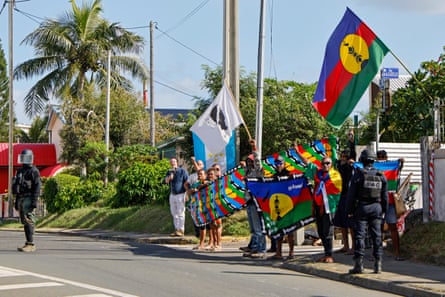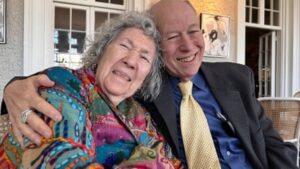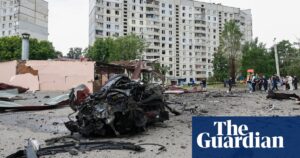The French president, Emmanuel Macron, has vowed not to force through voting change in the Pacific territory of New Caledonia after anger over the plans sparked more than a week of unrest, arson and looting that left six people dead and hundreds injured.
“I have pledged that this reform will not be forced through in the current context,” Macron said as he made a visit to New Caledonia. He said more talks were needed and he would review the situation within a month.
Macron said France would “allow some weeks to allow a calming of tensions and resumption of dialogue to find a broad accord” among all parties in the French overseas territory.
Indigenous Kanak people, who make up about 41% of the population, have responded with anger to constitutional changes backed by Paris that would give voting rights to tens of thousands of non-Indigenous residents. Local leaders fear the change would dilute the Kanak vote and undermine longstanding efforts to secure independence.
The territory of 270,000 people has been in turmoil since 13 May, experiencing its worst violence in 40 years. Nearly 400 public buildings, businesses, shops and homes have been destroyed by fires set by rioters in just over a week, according to the public prosecutor Yves Dupas.
Barricades and roadblocks have been set up on main traffic routes and there has been significant damage to roads, making access and travel in parts of New Caledonia difficult.
In a call in particular to Kanak representatives, Macron said all politicians needed to call “explicitly” for the lifting of the blockades. “Once these are withdrawn and this is confirmed the state of emergency will be lifted,” he said.
Macron said a mediation mission would be put in place to play an “impartial role” in resuming dialogue and finding a broad agreement between all the parties.
He said he was confident the parties involved could reach an accord in the “weeks and months to come”.
Rioting began last week as politicians in Paris, 10,600 miles (17,000km) away, voted on the voting rights bill, which would give French residents who have lived in New Caledonia for 10 years the right to vote in provincial elections.
Although the voting change has been approved by the French parliament’s lower house, it still needs final ratification.
New Caledonia has been ruled from Paris since the 1800s, and many Indigenous Kanaks resent France’s power over their islands and want fuller autonomy or independence.
As Macron arrived at La Tontouta international airport, about 30 miles from the New Caledonian capital, Nouméa, the president said French security forces would remain as long as necessary.
Macron flew by helicopter over areas devastated by arson, with bulldozers working to clear away rubble. Mayors from the worst-hit suburbs joined his meeting at France’s high commission, along with pro-French and pro-independence leaders.
Macron said the aim of the meeting was to get all parties back around the table, but his visit provoked mixed reactions among local politicians.
“It’s a staging. The format is not right,” said Roch Wamytan, an independence leader of the Caledonian Union and president of the Congress of New Caledonia, its legislature. “The question we are asking is: will the constitutional revision text be withdrawn to clear the way for in-depth discussions?”
Jimmy Naouna, of the Front de Libération Nationale Kanak et Socialiste of New Caledonia, wrote on X in response to news of Macron’s visit: “Here comes the fireman after he set the fire!”
An activist stationed at a roadblock who gave his name as Mike, said: “He [Macron] has to come. Because parliament is starting to turn against him. That’s why he’s coming. This reform needs to be removed. That law needs to go. If we want peace here in Kanaky, it has to be removed.”

Sonia Backès, a prominent pro-France figure and president of New Caledonia’s South Province, said Macron’s visit was “a strong sign of his willingness to find solutions, first on public order and justice, then politically”.
Virginie Ruffenach, a local politician and anti-independence leader, said the state “has an important role to play and has a lot of help to offer in this catastrophic situation”.
The unrest has left people in New Caledonia having to wait several hours to buy essential goods, and items are being rationed. The closure of banks and the destruction of many ATMs has made it difficult to obtain cash, which is widely used.
The people who spoke to the Guardian did not want to be named for fear they may be targeted. “There are young people causing trouble all night, gunshots all night. It doesn’t stop. We have been cloistered at home since Tuesday. It’s a lawless area,” said a resident of Logicoop, a particularly hard-hit neighbourhood in Nouméa.
Another resident from Logicoop felt safer but feared a police presence could stir unrest in the neighbourhood.
“We were a little scared the first two days when they started burning everything around. Today, we feel relatively safe in the neighbourhood,” the person said. “Things are going well between the different communities and there is a lot of mutual aid. We haven’t seen a single police officer since the beginning, and we’re afraid things will heat up when they arrive.”
Source: theguardian.com


















